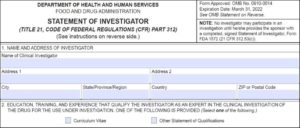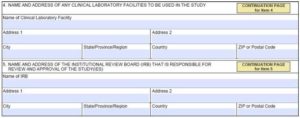Clinical Researcher—April 2019 (Volume 33, Issue 4)
PEER REVIEWED
The U.S. Food and Drug Administration’s (FDA’s) Form FDA 1572 is one of the many important regulatory documents submitted to the agency in connection with clinical trials. Many common mistakes are made when filling out and maintaining the 1572 form, so the hope is that this guide will be useful to new sites, clinical research coordinators (CRCs), clinical research associates (CRAs), and other clinical research professionals.
This guide serves as a quick read in very simplistic and clear language that defines what a 1572 is, what a principal investigator (PI) is committing to when signing this document, how to fill it out, how to avoid common mistakes, and how to maintain it for the duration of the study. In addition, this guide offers a detailed look at each section of the document. [A downloadable PDF showing these sections more clearly is available here: Form FDA 1572 figures.]
What is the Form FDA 1572 (Statement of Investigator)?
The Statement of Investigator (Form FDA 1572) is a form that is required to be filled for clinical trials involving investigational drugs or biologics. Through this form, the PI provides specific information to the sponsor, including his/her qualifications and information about the clinical site, in aim of assuring conduct of the clinical trial according to FDA regulations and guidelines.{1} By signing the 1572 form, the PI is making a legal commitment to adhere to FDA expectations by:
- Agreeing to supervise or conduct the investigational trial according to the current study protocol. No changes are to be made to the study protocol without the sponsor’s and institutional review board’s (IRB’s) acknowledgment and approval, unless it was mandatory for the purposes of protection and safety of the subjects.
- Assuring his/her understanding of the study protocol and investigational brochure, including the potential side effects associated with the investigational product and his/her responsibility to ensure that all study personal involved in the conduct of the trial understand their responsibilities and duties.
- Reporting all adverse events and serious adverse events to the sponsor that occur during the conduct of the trial in accordance with Title 21 CFR 312.68 in the Code of Federal Regulations.
- Agreeing to obtain an informed consent form (ICF) from each participant by using the most up-to-date and IRB- and sponsor-approved ICF in accordance with Title 21 CFR part 50.
- Agreeing to maintain adequate and accurate records and having them available for inspections in accordance with Title 21 CFR 312.62 and 312.68.
- Agreeing to comply with all other requirements regarding the obligation of clinical investigations and all other pertinent requirements in accordance with title 21 CFR part 312.
- Agreeing to oversight from an IRB that complies with all the requirements of title 21 CFR Part 56 and will be responsible for receiving and approving of the clinical investigation from beginning of the study until closeout. By this, he/she also agrees to report promptly any changes in the research activity, including any unanticipated problems involving risks to human subjects.{2}
When Must the Form FDA 1572 be Signed?
According to U.S. regulations, the Form FDA 1572 is required to be collected from all PIs for studies being conducted under an Investigational New Drug (IND) application, which would include clinical studies of an investigational product or biologic, excluding device-related clinical trials (which require a similar form called an “investigator agreement” to be filled out under an Investigational Device Exemption application.{1}
When Must the Form be Updated or a New One Completed?
- In cases when a new site is added or of replacement of an investigator at an existing site, a 1572 must be submitted to the FDA within a 30-day window of the site’s/investigator’s addition/replacement.
- Another case when a 1572 should be updated is when any site information is changed, such as the IRB or laboratory affiliated with that site.{3}
- Most sponsors require that if the PI listed in the current 1572 has his/her name changed for any reason (e.g., marital status), the document should be If a sub-investigator has a name change, then in most cases sponsors ask for the form to be updated or a note to file provided explaining the name discrepancy from an audit and Good Clinical Practice (GCP) perspective.
Dissecting the Form FDA 1572 for Principal Investigators and Sub-Investigators
Sections 1 and 2

Important notes to keep in mind when filling Sections 1 and 2 include:
- Section 1: The name of the PI must match his/her legal name as it appears on legal documents, certificates, or qualifications (e.g., birth certificates, marriage certificate, medical licenses, or other titles). In cases when a co-investigator is assigned, then under 21 CFR 312.3 (b) the co-investigator must fill out and sign a separate 1572 form.
- The address to provide in Section 1 of the 1572 is for the PI’s office, study site, or other business place where he/she can be reached by mail or in person.
- In any case when the PI is replaced with another investigator, Section 1 must be updated by filling out a new 1572 and supporting all required documentation listed in Section 2 in this form.{2}
- Section 2: Requires attachment of all investigators’ curricula vitae (CVs) or “Other Statement of Qualifications” showing the education, training, and experience that qualifies the investigator as an expert in the conduct of the clinical trial of the drug/biologic under investigation.
Frequently Asked Questions for Sections 1 and 2
Q: What qualifications are needed to be assigned as a PI?
A: There are no specific requirements stated by the FDA in terms of the PI’s qualifications. However, sponsors will always aim to select PIs who are qualified by training and experience to conduct the clinical trial, including their familiarity with human subject protection regulations (i.e., 21 CFR Parts 50 and 56) and GCP regulations (see 21 CFR Part 312).{2}
Q: Is it necessary that the assigned PI be a physician?
A: Again, the sponsor selects PIs who are qualified by training and experience to conduct the clinical trial, but there are no minimum requirements for the PI to be a physician. In cases when the sponsor selects a PI who is not a physician, a qualified sub- investigator (physician) must be listed on the 1572 for the trial to make all medical-related decisions.{4}
Sections 4 and 5

Frequently Asked Questions for Sections 4 and 5
Q: What types of laboratories should be listed in this section?
A: Note that it is vital to list all clinical laboratories or clinics that primarily conduct tests that are required or part of the clinical study. The listing of laboratories is not limited to laboratories conducting blood work, X-rays, etc.; it is very important to include any laboratories supporting pharmacokinetic and efficacy analyses for clinical trials listed under an IND application. In cases when the clinical laboratories or facilities are using another contract lab or satellite location, it is required that only the primary laboratory be listed, where it is used as a point of reference to trace samples to each of the contracted labs or satellites.{5}
Further, you should list all involved IRBs that will be reviewing and approving all related study materials.{2}
Section 6
![]()
Section 6 is provided for delivering names of individuals listed as sub-investigators. According to 21 CFR 312.3(b), when an investigational study is conducted by a team, the PI is the sole lead of this formed team. All individuals who are assisting the PI and directly contributing to conduct of study procedures specified in the protocol and generation of data must be listed as sub-investigators on the Form FDA 1572.
It is the responsibility of the PI to supervise the team and delegate responsibilities and tasks appropriately, based on the team members’ qualifications, education, and training. Any other office staff who provide any type of care or service that does not contribute to the overall generation of the trials clinical data do not need to be listed as a sub-investigator.{4}
Use the Continuation Page if additional space is needed.
Section 8

- Check only one box that is applicable to the type of clinical trial being conducted.
- For combined Phase I and II clinical studies, check only one box.
- Check the second box for Phase IV clinical investigations.
Section 10
![]()
Important notes to keep in mind when filling Section 10 include the following:
- The date must represent the date the form was signed by the PI.
- The signature must match the individual’s name listed in Section 1.
- Sites never directly submit this form to the FDA; once completed, it is necessary for the site to provide all the other documents requested along with this form in Section 2 to the sponsor.{5}
Common Mistakes Identified in Audits
- Submission of incorrectly completed forms.
- Missing submission of requested documents in Section 2, especially when study personnel have been added to the 1572 or in cases when the original PI has been replaced.
- Failure to submit updated 1572 forms to both IRBs and sponsors.
- Site not having CVs for all study personnel listed on the 1572 form.
- Site lacking copies of current medical license for the PI.
- Upon collecting CVs that are not specific templates, it very important to be mindful of data privacy issues and make sure no sensitive information is listed on study personnel CVs, such as Social Security numbers, family members’ information, etc.
- CVs provided are not current within the last two years.
- Missing documentation within the PI’s CV of the his/her affiliation with the site conducting the clinical trial.
Form FDA 1572 Expiration Date
The most recent version of the Form FDA 1572 can be obtained from www.fda.gov/downloads/AboutFDA/ReportsManualsForms/Forms/UCM074728.pdf.
In cases when a Form FDA 1572 is being collected shortly before a new version is released, sponsors can use the current version to obtain signed agreements from clinical investigators participating in their clinical studies. The expiration date given for using the form reflects the U.S. Office of Management and Budget’s clearance of the form as meeting the requirements of the Paperwork Reduction Act. Despite the fact the form carries an expiration date, there is no need to provide a new form after the new version with the latest expiration date has been released.
Conclusion
For new clinical research professionals entering the field or in need of a refresher to their current knowledge, this paper was written as a guide to all study site staff, including CRCs, CRAs, PIs, and sub-investigators. It is very important to understand the many regulatory documents used in clinical trials—what they mean and how to fill out and maintain them properly. As there may be many more details readers have questions about that are not covered in this article, please visit the references and resource cited below for any extra information needed.
References
- TransCelerate Biopharma Inc. Information and guidance sheet for the completion of the Statement of Investigator Form. (Form FDA 1572). http://www.transceleratebiopharmainc.com/wp-content/uploads/2015/04/TransCelerate-21CFRpart312-Statement-of-Investigator-Guidance-JUNE-2015-.pdf
- U.S. Food and Drug Administration. Form FDA 1572 (Statement of Investigator) (OMB No. 0910-0014, expiration date February 28, 2019). https://www.fda.gov/downloads/AboutFDA/ReportsManualsForms/Forms/UCM074728.pdf
- http://regardd.org/drugs/initial-ind-submission
- U.S. Food and Drug Administration. Information Sheet Guidance for Sponsors, Clinical Investigators, and IRBs. Frequently Asked Questions—Statement of Investigator (Form FDA 1572). https://www.fda.gov/downloads/RegulatoryInformation/Guidances/UCM214282.pdf
- U.S. Food and Drug Administration. Form FDA 1572 Instructional Supplement. https://www.fda.gov/downloads/aboutfda/reportsmanualsforms/forms/ucm223432.pdf
Resource
Sather S. 2019. The CRC’s Guide to Coordinating Clinical Research (Fourth Edition). CenterWatch. Boston, Mass. https://store.centerwatch.com/p-604-the-crcs-guide-to-coordinating-clinical-research-fourth-edition.aspx
The author of this article is a clinical research professional who wishes to remain anonymous.



